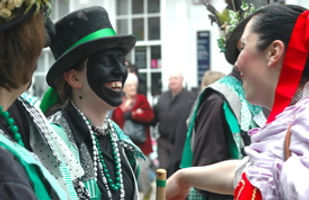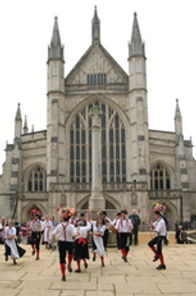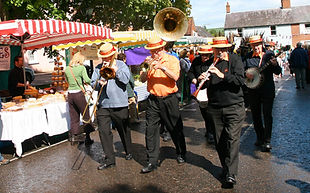Festival management



“You should make a point of trying everything once, excepting incest and folk dancing.”
'Farewell My Youth' Arnold Bax, English composer (1883-1953)
The first thing to say is that virtually all those involved with festivals are unpaid volunteers. Enthusiastic, yes. But if you have ever tried to herd cats, you'll appreciate the issues that arise when leading such groups. More on that anon.
Throughout the past two decades, I have been privileged to work with hundreds, if not thousands, of such individuals on a wide range of UK food, music, dance and arts festivals. Each committed their own time, energy and talents to the festival and had their own reasons for wanting to be involved. Some were singers, musicians or dancers, others were chefs, food producers and restaurateurs. Many viewed the festival as a showcase. Local businesses saw it as a useful magnet. Charities, sports clubs and others in the community viewed festivals as a chance to earn extra funds for their organisation by volunteering their members as venue stewards, traffic marshals, litter pickers or a host of other activities crucial to the smooth-running of any festival.
So what brought me into the world of festival management?
Like much else in my life, and I suspect in yours, it arose from a series of unrelated happenstances. In 2000, I sang as Captain Zuniga in Bizet's 'Carmen'. Opposite me, in the role of Carmen, was a truly remarkable singer who, soon after the final curtain fell on the opera, was invited to front a talented folk group. In time, I attended the group's rehearsals and even became their sound engineer at a few gigs. One of the group was Richard Brecknock, a major name at Sidmouth Folkweek. At one gig, he mentioned that - through lack of volunteers - the Winchester Folk Festival (WFF) had stuttered to a standstill after 30 years. He asked me to join him at a meeting of enthusiasts keen to resurrect it. He felt that my involvement with the rebuild of the Theatre Royal Winchester and wider business experience might be useful. Flattered and intrigued, I duly attended.
The upshot was that a number of people attending the meeting volunteered to take on various tasks. Two had been part of the diminished team that had run WFF. In the event, most of the 'volunteers' slipped away over the ensuing months and left just Richard, me and the two WFF volunteers to plan the rebirth. Fortunately, several others joined the team and, in due course, the festival (renamed Winchester MAYfest) returned to the UK festival calendar.
With absolutely no previous experience of festival management, I had to climb a very steep learning curve. We made mistakes - who doesn't? An overly ambitious programme in years 1 and 2 and insufficient marketing meant we didn't always have enough 'bums on seats'. We learned and 'cut our suit to suit our cloth'. Furthermore, being more of a
jazz and blues fan than lover of folk music, I built up a pub-based programme of music that we named 'PUBfest'. Sponsorship came from drinks manufacturers and Enterprise Inns (owners of several pubs in Winchester). The extra funds meant that we could ensure that MAYfest remained as a major UK folk music and dance festival.
What struck me then, and still does today, was the generous help and advice that we received from other festival organisers. Early on, I realised that MAYfest could benefit from featuring an arts and crafts market as part of the festival. It would attract additional visitors, provide a colourful backdrop to our outdoor events and generate much-needed funds. As markets were a key element of Winchester's hugely successful Hat Fair, I approached Sian Thomas, then that festival's director, and asked whether she could offer any advice. Silly boy....I should have known better because after helping her one year, I became Director of the Hat Fair markets for several years. Of course, that experience proved invaluable for us at MAYfest (and the many other festivals that I ran in later years).
Meanwhile, as the Health & Safety brigade turned their attention to festivals, there was an increasing need for we festival organisers to take our management responsibilities more seriously. Risk assessments, traffic management plans, event management plans, etc became something that we must all now provide to the necessary authorities - police, ambulance, fire, environmental health, licensing, etc - often called Safety Advisory Groups (SAGs)'.
MAYfest managed to pass SAG scrutiny without too much bother. The same wasn't always true for other festivals in/around Winchester. One example was the Alresford Watercress Festival (AWF), the organisers of which were summoned by Winchester's SAG in 2007 to discuss their plans for the increasingly popular street-based food festival. There were concerns that the increasing number of visitors (6,000 back then...now over 18,000) packed into the streets of the delightful Hampshire market town could cause issues of traffic management, public safety, crowd control, etc. As I was then living in Alresford and had some experience of festival management, I was asked to help. I duly did so and took on the job of Festival Manager for AWF until 2018.
In the introduction to this topic, I mentioned the challenges of harnessing the energies and commitment of volunteers. I alluded to herding cats. If I think back to my early years managing AWF, I can still recall monthly planning meetings that were little more than a free-for-all and where those with the loudest voice often dominated proceedings. Most, if not all, those attending gave the distinct impression that they believed they had the right to express an opinion on any topic discussed whether or not they had formed any cogent arguments on the matter. I found this hugely frustrating. So, exercising my executive prerogative, I structured the 'committee' as a number of small groups along the lines of the task forces that I'd led during my working life.
Each group comprised no more than six members and each was charged with planning a specific area. An example was the Event Management Group (EMG). I ran this group and we met every month in my cottage (amply fed and watered) and planned the festival's entertainment and markets. Similarly, the Traffic Management Group (TMG) met monthly and took on responsibility for planning the movement and parking of 4/5,000 vehicles in/near the town on the day of the festival. There were another three such groups - logistics, finance and publicity.
Without exception, each management group contained someone with expertise in the areas being planned. For example, a local PR expert headed the Publicity Management Group. An accountant worked in the Finance Management Group and a former police officer headed the Traffic Management Group.
When the groups had found their feet, the leader of each reported their group's plans and progress to the whole committee at the monthly meetings. These plans were then discussed (and approved, if necessary) and anyone was at liberty to comment. As you would expect, there were some in the committee who had been involved in AWF in previous years and had alternative opinions to express. That was always seen as welcome if, at times, I had to work hard to smooth feathers. But, by and large, we worked as an effective group, as the festival's success demonstrated.
This festival joined a list of many that I have either managed or in which I have been involved in other ways:
-
Winchester MAYfest
-
Winchester Hat Fair
-
Sidmouth Folkweek
-
Marlborough Jazz Festival
-
Winchester's One Big Table (and festival of volunteering)
-
Alresford Watercress Festival
-
Shaftesbury Festival
-
20+ street festivals that I organised on behalf of Winchester City Council/Winchester BID
Over 20 years, I have accumulated/created a wide range of documents that have proved invaluable. I attach pdfs of three that are probably the most important for any event, large or small. I hope that they are of value to you.
Event Management Plan
Traffic Management Plan
Risk Assessment